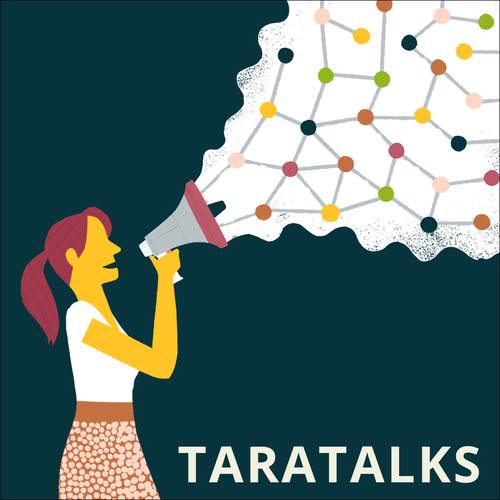Ami Radunskaya made it in two careers that are pretty tough to break into: playing in an orchestra & being one of the few women in mathematics. Throw single motherhood into the mix, and it’s evident that playing the Sinfonia Concertante in e minor, solving the Diophantine equation or tackling grad school with a toddler in tow likely wouldn’t daunt her.
In our recent TARATALK, Ami, a mathematics professor at Pomona College in California, shared with founder and CEO D. Sangeeta her six key life lessons. She credits her “stubborn streak” and—most importantly—the support of friends and family for getting her to where she is today.
Ami’s stubborn streak showed up early in life. When she was four, Ami wanted to be like her older sisters and take piano lessons. Her parents weren’t keen on the idea because they felt she was too young, but that didn’t stop Ami. “I sat on the steps of their piano teacher’s house in protest, and finally, he came out and said, ‘Okay, I’ll teach you for free!’ I was passionate [to learn to play.]” Her lofty dream—especially for someone so young—was to become a Mozart specialist on the piano. At nine, she switched to the cello when she realized cellists played with others in groups. She said she also loved science and math, but it didn’t seem like a career to her.
(See below to see how Ami made the leap from music to math.)


“As women, you’ll receive a lot of negative advice. You’ll be told you can’t do that; you’re too old for that—or, girls don’t do that! I had one person tell me that girls don’t play Bach. Don’t listen to it. You know yourselves best.”
AMI Radunskaya
AMI’s SIX LIFE LESSONS FOR WOMEN IN MATHEMATICS
1. Build a cheering squad.
“Surround yourself with people who think you’re awesome. I had supportive sisters, very supportive friends and a very supportive son…. It took a village to get me to where I am.”
2. Balance motherhood with your passions.
“Take [maternity leave] to be with your kid, but you don’t necessarily have to take time off from what you love doing. … scholarly activities, or teaching or writing music. You just have to juggle the time. It’s the time that becomes the precious commodity. You don’t want to divorce yourself from your passions completely—motherhood should not take that away from you. Try to do the stuff you like but not the stuff you hate if someone can cover for you.”
3. Be your #1 priority.
“Your wellbeing has got to be the most important thing. That is your life. Now hopefully, your professional life supports that personal wellbeing. If it starts to not be, then I would say you should consider some kind of change because there is a way to morph your professional life to support your personal flourishing.”
4. Decide what success means to you.
“Often, we start with this very narrow view of what success is… but there are many ways to define success. In math, you don’t have to prove a famous theorem or win the biggest prize to be a success; you can enjoy teaching or work with other people on strategies for delivering cancer vaccines, and that can be very rewarding.”
5. Don’t listen to naysayers.
“I learned to deal with this when I was a musician because you get a lot of nasty talk in the music world. [One composer told me] ‘You just have to let these comments roll off of you like water off a duck’s back. But there were tough negative voices, and it took more work for them to slide away. I studied techniques, like imagining the [negative] voice on one channel, switching to another channel, or putting [the negative comments] in a bubble and letting them float away. There are times when comments are so hurtful that you have to turn them off consciously.”
6. Reach out. Ask for advice
“There are many people out there who want to help you. They have been through things and rejoice in giving advice. It’s not a burden to talk to you.”
We couldn’t agree more with #6. That’s what we’re all about here at Gotara. Join our global advice platform for women in STEM + and you have access to personalized, confidential advice from women who have walked in your shoes. And as Ami says, our Gotara advisors also rejoice in sharing what they have learned to help you soar in your STEM careers.

#HerStory

Ami Radunskaya
Mathematics Professor
Pomona College
Co-director of
EDGE: Enhancing Diversity
in Graduate Education
Follow
Ami’s Career Path to Joining other Women in Mathematics
At 17, Ami was playing in the Oakland Symphony while attending the University of California, Berkeley, until she was forced to make a tough decision. She had a concert the same day as a chemistry final and asked her prof if she could take the exam earlier. “He said, ‘Are you kidding me? You decide. What do you want to do?’” She took the final in one hour and rushed over to the theatre for the concert, but Ami knew that she did have to make a decision. She loved being a musician and she figured that career would be more challenging to come back to than returning to school. “So, I dropped out! I’m a university dropout; there you go! I played music for ten years, and the whole time I couldn’t believe I was getting paid for it.”
For the next decade, Ami toured around the world, living her dream. Then her son came along. At first, it was easy to take him on the road with her, including two tours of Europe before he was six months old. But when he was one, the itinerant lifestyle became more difficult. So, once again, Ami was faced with another key life decision.
“I thought I have to change my life,” she shared. “I can’t just be gallivanting about. I need to do something that keeps me home at night. So, I thought, ‘I think I’ll go to college.’” Ami started in chemistry but found all the intricate measuring in the lab tedious. She loved computer music, so dallied with the idea of switching to computer science until she realized that scene in the early ’80s wasn’t something she was comfortable with. “There were a lot of guys who seemed to like to work in the dark,” she laughed. “So, I thought I would switch to math.”
Forget about Meddlers and Seek out Mentors
And the rest, as they say, is history. Ami is grateful for the encouragement she received to go onto grad school. Still, there were naysayers along the way who discouraged her from pursuing an academic career, yet she persisted. She says her son was her biggest champion. “Some people would say, “How did you make it through school with a little kid,” and I’d say, “How could I have made it without him?” When I was unhappy with my prof, he’d go, ‘That stupid doctor so and so. Mom, you’re the smartest person in the world.’ I still have on my wall his “Greatest Mom in the World” certificate next to my degrees.”
It took grit—and that stubborn streak mentioned above—but Ami doesn’t think it’s fair to expect that of everyone. She recalls being at one conference where they talked about getting more women in STEM, and one man said to her. “’You just have to tell students they can’t do it … that they aren’t cut out for it.’ I asked him, ‘Has anyone ever in your entire life told you that you couldn’t do something?’ These guys don’t get told that. Women get told that all the time – explicitly and implicitly.”
Her advice? “As women, you’ll receive a lot of negative advice. You’ll be told you can’t do that; you’re too old for that—or, girls don’t do that! I had one person tell me that girls don’t play Bach,” recalled Ami. “Don’t listen to it. You know yourselves best.”
As for having to be tough to make it, Ami doesn’t buy that either because it excludes sensitive and warm and creative people. “Why can’t we show our true inner selves and bring that into mathematics?” she asked. “It’s not right that certain groups get to bring all of themselves and other groups have to have this tough exterior. It’s also blaming the person. If someone isn’t succeeding because they’re not tough enough, you’re blaming the person rather than the structure that’s requiring them to put a shell around themselves, and I don’t think that’s right.”
How can women in mathematics get an EDGE?
It’s a perspective she brings to her work as co-director of EDGE: Enhancing Diversity in Graduate Education. It’s been running for 20 years, and it’s a program that supports women getting PHDs in mathematical sciences with a focus on women from all sorts of backgrounds. “Since 1998, we have had over 100 PhDs and many from under-represented groups,” said Ami. “If you look at data in the country, this intersection between underrepresented minorities and women is something that we need to work on as a community.”
With her characteristic “stubborn” streak and empathetic outlook, Ami will no doubt continue to give a much-needed edge to those who share her dream to have meaningful careers in mathematics regardless of their gender or background.





